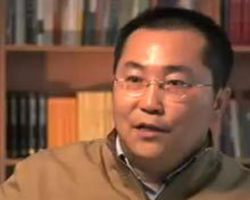
In 2008, prior to the Beijing Olympics, Chicago Tribune journalist Evan Osnos produced a piece for the PBS program Frontline called "Jesus in China," in which he explored the growth of Christianity and its potential to transform China. He interviewed Christians from rural house churches, urban house churches (including Pastor Jin, who was featured in the previous post), Three-Self churches, and academics.
One of the academics he talked to was Dr. Zhao Xiao, a prominent Christian economist who argues that Christianity can be a positive force for China's economic development. As a result of his research on Christianity, he became a Christian.
Dr. Zhao continues to speak and write on this subject, both inside of China and outside. He is active on China's micro-blogging platform Weibo (@zhaoxiaolovegod), where he has more than 4 million followers.
Here are some excerpts from the interview by Osnos:
Evan Osnos: When did you begin studying the U.S. markets to write the article about Christianitys influence on them?
Zhao Xiao: I wrote it in 2002. During that time, I went to America to observe and study what kind of differences there are between the market economies of the United States and China. The one fundamental difference I discovered is that, in America, there are churches everywhere. On the other hand, in Chinaand Ill crack a joke there are bathhouses everywhere. So I wrote an article entitled "Market Economies With Churches and Market Economies Without Churches." This is the first time in the 20 years of China's reform and opening up that anyone in the field of economics undertook a comparison of different market economies from the perspective of morality and a moral market.
Evan Osnos: What would a blend of Christian beliefs and Chinese culture bring to China?
Zhao Xiao: I believe that it will bring two things, and these two things will be very important for the future social structure of China. The first thing it will bring is a spirit of contracts. We know that, whether it is a market economy or a constitutional system, behind them all is a civilization based upon rules. So what we need is a group of people who observe rules. Only then can this system work with highest efficiency. And this spirit of contracts, it comes from belief in Christianity, because we know that in the Bible, for instance, there are the Ten Commandments. These are contracts God signed with humans.The second thing it will bring is the spirit of universal love. There is no culture that can match Christianitys degree of prizing love, because what it emphasizes is a form of unconditional love, a love for everyone, including those who are not lovable, including those who have hurt you or oppressed you. You have to love them, regardless of whether they are good or bad to you, regardless of whoever they are, you must love them. So this kind of love is a sign of the openness of modern society and modern civilization.
It is commonly said that the traditional love in China is called a hierarchical love, a love with ranks, with differences. In recent history, there was a great man in China, and even he said this: "I f others do not wrong me, then I do not wrong them. If others wrong me, I will necessarily wrong others. Commonly, Chinese people believe this, especially in the past few decades; Chinese people commonly use the phrase there is no love without reason and no hate without reason. Well, this kind of culture and attitude has caused us to be unable to love others. But if Chinese society wants to have more openness, more harmony, then it needs the spirit of universal love.
You can find the entire interview here.
Image source: Sunday Night Traffic At Guomao, Beijing, by Jens Schott Knudsen, via Flickr
Are you enjoying a cup of good coffee or fragrant tea while reading the latest ChinaSource post? Consider donating the cost of that “cuppa” to support our content so we can continue to serve you with the latest on Christianity in China.
